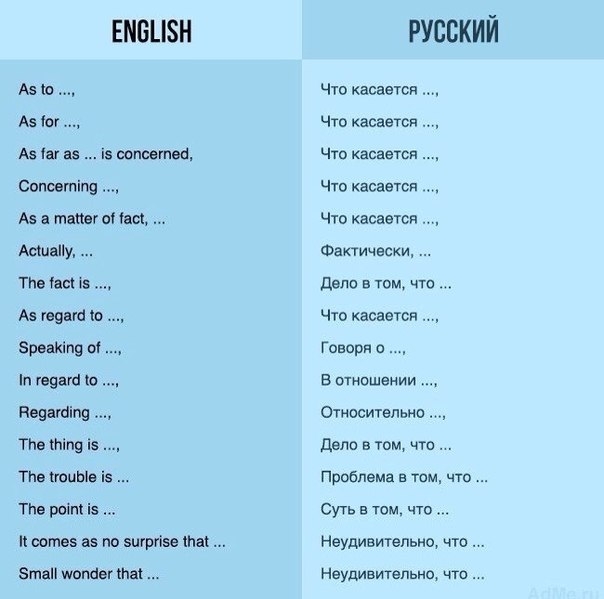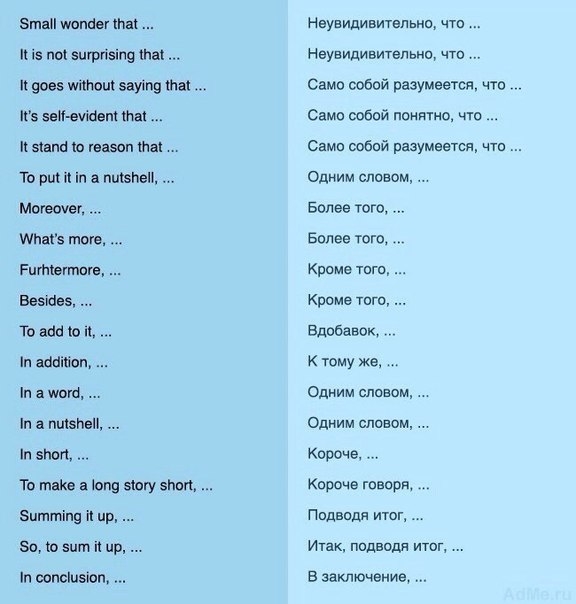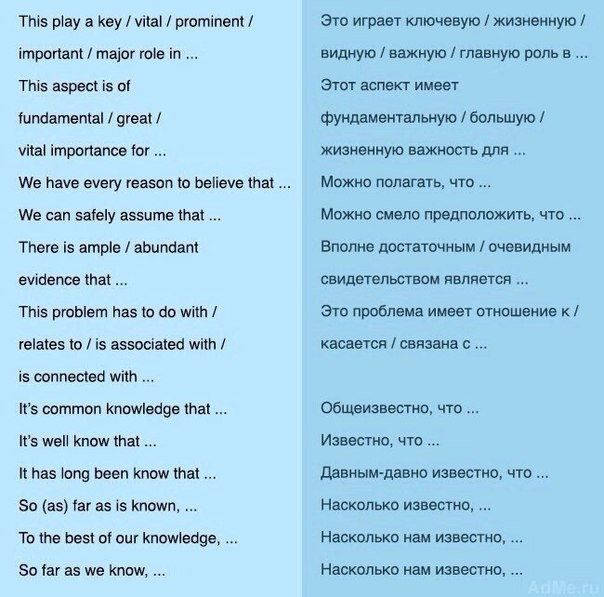Список вводных и завершающих слов и предложений:
as a matter of fact - собственно говоря
as things turned out - как оказалось
as to / as for - что касается
at first sight / at a glance - с первого взгляда
at any rate - во всяком случае
at first - во-первых
at least - по крайней мере
believe it or not - веришь или нет, но
by the way - кстати
deep down - в глубине души (на самом деле)
first of all - прежде всего
for all / for all that - тем не менее
for example / for instance / for one thing - например,.
for one thing - первым делом
for one's part / on one's part - что касается конкретного человека
for the most part - вообще
I dare say - осмелюсь сказать,.
I wonder. - интересно
if I remember rightly - если я правильно помню
if I'm not mistaken - если я не ошибаюсь
in a nutshell - вкратце
in all probability / in all likelihood - по всей вероятности
in any case - в любом случае
in fact - на самом деле
in my opinion - по моему мнению
In other words - другими словами,
in short / in brief / in a word - короче
in the long run - в конечном счёте
it turned out that - оказалось, что
just for the record - для справки, скажу сразу
lay it on the line - говорить начистоту
let alone - не говоря уж о
look here - послушай
not to mention - не говоря уж о том
on the contrary - наоборот
one way or another - так или иначе
or what? - или как?
or whatever - или что-то ещё
something tells me - что-то мне подсказывает,.
that is to say - иначе говоря
that's the way things are going - вот как обстоят дела
to say nothing of - не говоря уж о
to say the truth - по правде сказать
to sum up - подводя итог
as a matter of fact - собственно говоря
as things turned out - как оказалось
as to / as for - что касается
at first sight / at a glance - с первого взгляда
at any rate - во всяком случае
at first - во-первых
at least - по крайней мере
believe it or not - веришь или нет, но
by the way - кстати
deep down - в глубине души (на самом деле)
first of all - прежде всего
for all / for all that - тем не менее
for example / for instance / for one thing - например,.
for one thing - первым делом
for one's part / on one's part - что касается конкретного человека
for the most part - вообще
I dare say - осмелюсь сказать,.
I wonder. - интересно
if I remember rightly - если я правильно помню
if I'm not mistaken - если я не ошибаюсь
in a nutshell - вкратце
in all probability / in all likelihood - по всей вероятности
in any case - в любом случае
in fact - на самом деле
in my opinion - по моему мнению
In other words - другими словами,
in short / in brief / in a word - короче
in the long run - в конечном счёте
it turned out that - оказалось, что
just for the record - для справки, скажу сразу
lay it on the line - говорить начистоту
let alone - не говоря уж о
look here - послушай
not to mention - не говоря уж о том
on the contrary - наоборот
one way or another - так или иначе
or what? - или как?
or whatever - или что-то ещё
something tells me - что-то мне подсказывает,.
that is to say - иначе говоря
that's the way things are going - вот как обстоят дела
to say nothing of - не говоря уж о
to say the truth - по правде сказать
to sum up - подводя итог







